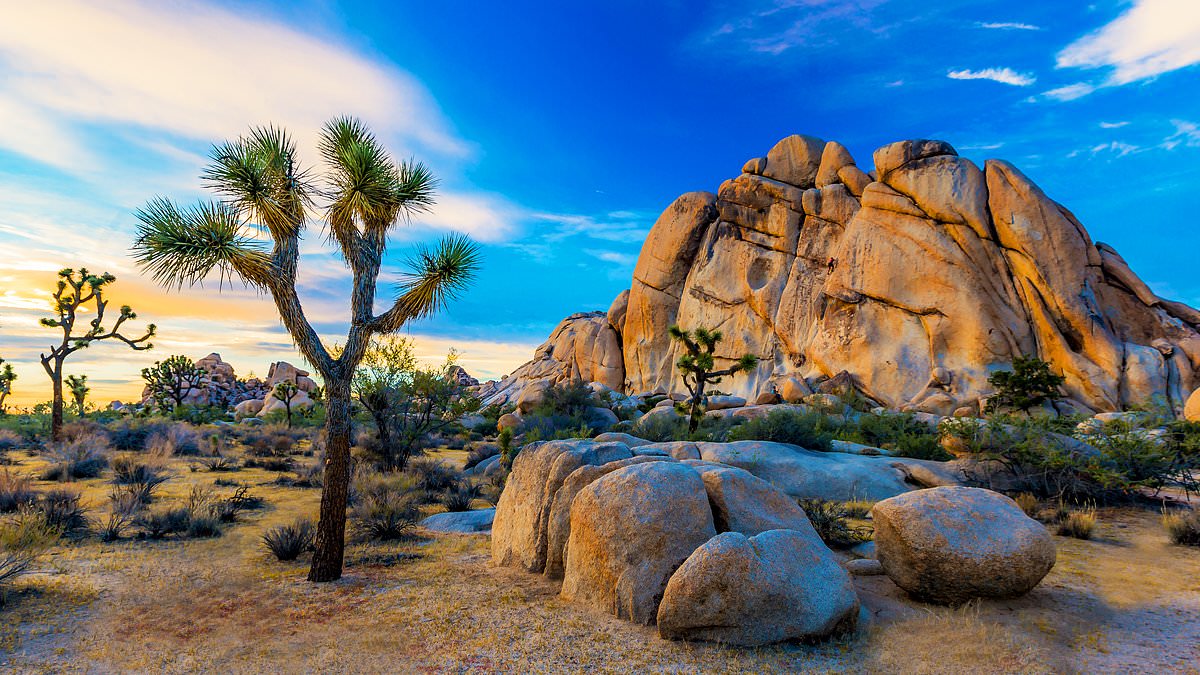Furious residents near Joshua Tree National Park have filed a lawsuit to stop a sprawling luxury ‘glamping’ resort from being built just a half-mile their quiet desert community.
The Ofland Hotel, approved in July by Twentynine Palms city council, would sprawl across 152 acres and feature 100 units hosting up to 400 guests, pools, splash pads, a spa, a restaurant, and even an outdoor movie theater with ambient music.
Developers call it eco-friendly, but critics say the city signed off without conducting the full environmental review state law requires.
Residents say the development would pose a threat to the wealth of wildlife in the area including endangered desert tortoises, burrowing owls and American badgers.
On Wednesday, the Center for Biological Diversity and Indian Cove Neighbors took the city to court the Los Angeles Times reports, accusing officials of violating the California Environmental Quality Act by fast-tracking the resort.
‘If we want people to enjoy the great outdoors, we have to support responsible development that doesn’t desecrate it. Unfortunately, Ofland Hotel isn’t a responsible development,’ said Meredith Stevenson, an attorney with the Center.
‘The law is clear in requiring projects to identify and reduce wildlife harms, air pollution and other irreversible consequences. The future of this unique desert community relies on leaders following the law.’
The lawsuit claims the city failed to consider how traffic, greenhouse gas emissions and construction would impact sensitive animals in a critical wildlife corridor that links the national park to undeveloped land.
It also alleges the city provided only 20 days for public comment instead of the legally required 30.
Residents who live near the project site say they aren’t opposed to growth, just to ‘reckless’ development.
‘We moved to Twentynine Palms because it borders one of the most beautiful national parks in the country,’ said John Talley-Jones.
‘I know I’m not the only one who values the open space and daily visits by wildlife – even the rattlesnakes, tarantulas and scorpions. I welcome growth, but it has to respect what makes this place special. When projects touch the park’s buffer zone or wildlife corridors, we need strict review.’
His neighbor Tonya Jones added: ‘This is about more than opposing a single development. It is about honoring the natural harmony of this desert community, where people and the environment are deeply connected.’
Cindy Bernard, who has personally seen tortoises emerge from burrows on her property, told the LA Times that the council failed to protect the very creatures the desert is known for.
‘The same noise and light issues that might disrupt our ability to see the night sky or enjoy the quiet will also affect the wildlife here. We’re not against this project. We’re against it here.’
Local bakery owner Travis Poston said his Indian Cove home has been a rare sanctuary from the grind of running a small business. He now fears that peace is under threat.
He warned that allowing a commercial resort in a residential neighborhood could open the floodgates to more development.
‘If this goes in, what’s next?’ Poston told the LA Times. ‘The whole area is on the chopping block at this point.’
But City manager Stone James, who also lives in Indian Cove, insisted the project will bring jobs and badly needed revenue to an area with a higher poverty rate than the state average.
He dismissed the legal challenge, describing complaints about the lack of a full environmental impact report as ‘a ruse’ to the LA Times.
‘We have a project that’s consistent with the core identity of our community, a conservation-based project that would allow people to come in[to] our community in a respectful manner and enjoy the beauty of Twentynine Palms, enjoy the beauty of the national park, visit the artists and people who are starting businesses in our downtown, and we’re going to say no to that?’ he said.
But residents pushed back. ‘There are no wealthy elites in the Morongo Basin,’ Bernard told the LA Times, adding that most members of the community rely on a fixed income.
Ofland Hotels, the Las Vegas-based firm behind the proposal, says it was drawn to the desert for its ‘natural beauty’ and ‘unique culture’.
‘The hotel buildings will be single-story to protect views and located at least 500 feet from neighboring properties to mitigate noise,’ Luke Searcy, head of development, told the LA Times.
He added the resort will pursue a Dark Sky International certificate to curb light pollution. But the lawsuit argues that even with those promises, the project will spill light across the desert, undermining stargazing in Joshua Tree National Park – an official International Dark Sky Park.
The Ofland Hotel would be the company’s biggest project yet. Las Vegas-based Ofland Hotels already operates an outdoor boutique resort in Escalante, Utah, and has another planned near the Great Smoky Mountains in Tennessee.
Developers say they intend to break ground in early 2027, with 42 acres built out for cabins and amenities and the remaining 110 acres reserved as ‘open space.’
But conservationists argue that label is misleading, since the land would still hold internal roads and a wastewater treatment plant – both of which, they warn, could expose wildlife to pollution and increase the risk of animals being struck by vehicles.
City officials signed off last month using what’s known as a ‘mitigated negative declaration,’ a streamlined approval process under California law that avoids a full environmental review if impacts are deemed minor or easily reduced.
Critics insist the harms here are anything but minor.
The lawsuit goes further, alleging the rezoning that allowed the resort also broke state housing law by slashing the potential for 61 residential units on the site.
Under the law, cities are barred from reducing housing capacity without making up the lost units elsewhere – something opponents say Twentynine Palms never did.
Daily Mail has contacted the city and Ofland Developments for comment.
